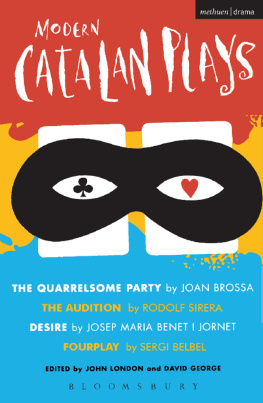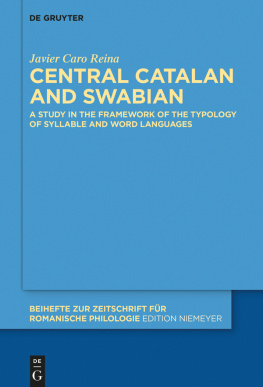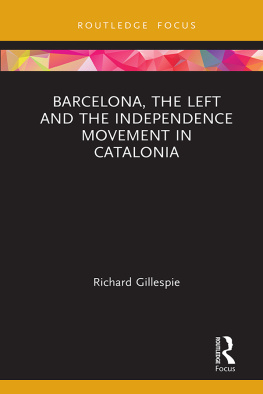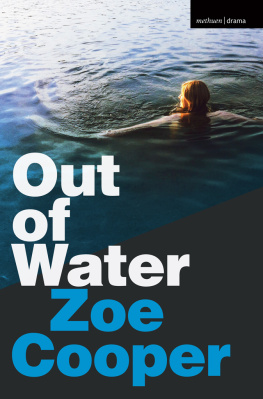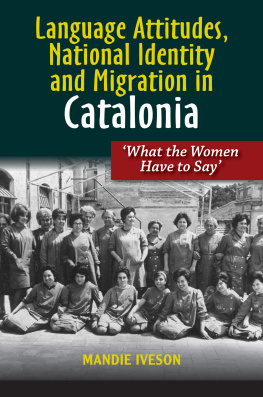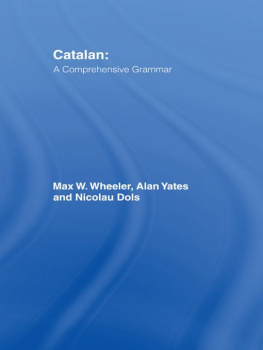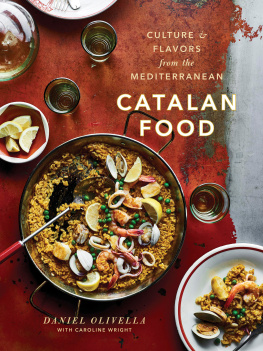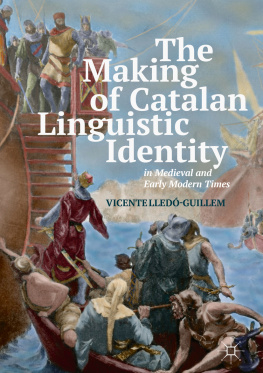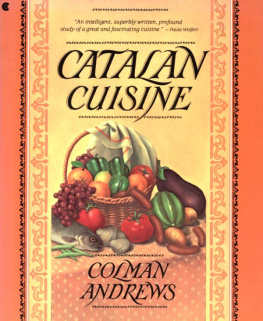Bloomsbury Methuen Drama
An imprint of Bloomsbury Publishing Plc
Imprint previously known as Methuen Drama
| 50 Bedford Square | 1385 Broadway |
| London | New York |
| WC1B 3DP | NY 10018 |
| UK | USA |
www.bloomsbury.com
BLOOMSBURY, METHUEN DRAMA and the Diana logo are trademarks of Bloomsbury Publishing Plc
This collection first published in Great Britain in 2000 by Methuen Publishing Limited
The Quarrelsome Party, originally entitled El sarau, dated March 1963. Translated from the text in Joan Brossa, Poesiaescnica, 6 vols (Barcelona: Edicions 62, 1973-83), IV (1980), pp. 161-207. Copyright Anna Garcia Jov, Laia Castae David George, John London, and the heirs of Joan Brossa, 2000.
The Audition, originally entitled El veridelteatre, dated January-February 1978. Translated from the text in Rodolf Sirera, Lassassinat del doctor Moraleda. El veridelteatre, Els Llibres de lEscorpi: Teatre/El Galliner, 47 (Barcelona: Edicions 62, 1978), pp. 85-117. An earlier version of this translation was published in Plays of the New Democratic Spain (1975-1990), edited by Patricia OConnor (Lanham, MD: University Press of America, 1992). Copyright Rodolf Sirera and John London.
Desire, originally entitled Desig, dated 19 March 11 July 1989. Translated from the text in Josep Maria Benet i Jornet, Desig, Teatre: Tresi Quatre, 24 (Valencia: Eliseu Climent, 1991). Copyright Sharon G. Feldman and Josep Maria Benet i Jornet, 2000.
Fourplay, originally entitled Tlem, written in 1989. Translated from the Catalan and Spanish texts in Sergi Belbel, Tlem, Teatre Catal Contemporani: Els Textos del Centre Dramtic, 1 (Barcelona: Department de Cultura de la Generalitat de Catalunya/Editorial Lumen, 1992) and Sergi Belbel, Tlem (lechoconyugal), Nuevo Teatro Espaol, 7 (Madrid: Centro Nacional de Nuevas Tendencias Escnicas, 1990). Copyright Sharon G. Feldman and Sergi Belbel, 2000.
The authors and translators have asserted their rights under the Copyright, Designs and Patents Act, 1988 to be identified as authors and translators of this work.
All rights reserved. No part of this publication may be reproduced or transmitted in any form or by any means, electronic or mechanical, including photocopying, recording, or any information storage or retrieval system, without prior permission in writing from the publishers.
No responsibility for loss caused to any individual or organization acting on or refraining from action as a result of the material in this publication can be accepted by Bloomsbury or the author.
All rights whatsoever in this play are strictly reserved and application for performance etc. should be made before rehearsals by professionals and by amateurs to: The Quarrelsome Party and The Audition: John London, 14 Leigh Street, London WC1H 9EW; Desire and Fourplay: Sharon G. Feldman, Department of Spanish and Portuguese, University of Kansas, Lawrence, Kansas 66045, USA. No performance may be given unless a licence has been obtained.
No rights in incidental music or songs contained in the work are hereby granted and performance rights for any performance/presentation whatsoever must be obtained from the respective copyright owners.
British Library Cataloguing-in-Publication Data
A catalogue record for this book is available from the British Library.
ISBN: PB: 978-0-4137-4440-1
ePDF: 978-1-4742-7896-6
ePub: 978-1-4742-7897-3
The publication of this book was made possible by a grant from the Instituci de les Lletres Catalanes in Barcelona. The anthology is dedicated to the memory of Joan Brossa (19191998), the poet and father of Catalan avant-garde theatre, who died as the volume was being completed.
The editors are grateful to the playwrights included in this anthology for their assistance with the translators queries. They would also like to thank the following for their advice: Maria Antnia Bab i Vila, Maria Delgado, Rosanna Eadie, Hans-Peter Kellner, Pepa Llopis, Andreu Rossinyol, Ddac Teixidor and Alan Yates. Some of John Londons work was financed by the Alexander von Humboldt-Stiftung and the Leverhulme Trust. Michael Earley of Methuen supported this project through all its stages.
If a major publisher had produced an anthology of Catalan plays twenty or even fifteen years ago, the introduction to such a collection would inevitably have sounded apologetic. Any argument for attention would have contained sentences full of worthy excuses: Hardly anybody outside Spain, or in some cases, hardly anybody outside Catalonia, has heard of these playwrights, but they have nonetheless written some exciting drama. The minority status of this Romance language should not obscure the quality of its theatre.
Now, at the beginning of a new millennium, there is no need for a defensive tone. Following the 1992 Olympic Games, Barcelona acquired a confident, new international status as the capital of Catalonia. The relaxation of anti-Catalan censorship after the death of General Franco in 1975 and a degree of regional autonomy have led to a flourishing cultural life. There is a vibrant literature in Catalan, continuing a tradition going back to the Middle Ages. Although memories may remain of the public burning of Catalan books at the beginning of the dictatorship (in 1939), the long, dark period of Francoism is at an end. Catalan is now taught in schools and universities. Catalan radio exists alongside Catalan television. There are daily newspapers in Catalan. Catalan translations of foreign books sometimes appear before Spanish translations.
This new assertiveness has meant that the traffic is not all one-way and that Joan Mir and Salvador Dal are not the only Catalans famous abroad. Ventura Pons has gained a cult following for his films, like Caresses, shot entirely with Catalan dialogue. Having been a linchpin of theatre in Barcelona, Llus Pasqual went on to become director of the Spanish National Theatre in Madrid (19831989) and artistic director of the Thtre de lEurope at the Odon in Paris in the 1990s. Anyone attending international theatre festivals will be familiar with the eye-catching antics of Catalan performance groups such as Els Joglars, La Cubana, La Fura dels Baus and Comediants. (The last two staged the opening and closing ceremonies to the Barcelona Olympic Games.)
Without the fireworks and mass spectacles of such companies, a few Catalan playwrights have already established a considerable reputation. Llusa Cunills The Meeting was commissioned as part of the Edinburgh International Festival in 1999. Josep Maria Benet i Jornets play in this volume, Desire, has been translated into Spanish, French and German. Rodolf Sireras The Audition has had Spanish, English, Italian, Portuguese, Greek and French productions. Sergi Belbel, the youngest and most performed writer in this selection, has been applauded throughout Europe. His play After the Rain was produced Off-Broadway in New York and both the Royal Court and the Gate theatres in London have presented his work. Joan Brossas highly original visual art is regularly exhibited in non-Spanish galleries. When it was first displayed in Great Britain, in 1992, the London listings magazine Time Out called the exhibition a brilliant, unmissable show.
The inroads made by these dramatists are not merely spontaneous instances of international recognition. They reflect an increased theatrical infrastructure in Catalonia and the Valencia region. This practical and financial backing accompanied the renewed enthusiasm of directors for contemporary plays during the late 1980s, in opposition to collective creation and the visually impressive, but largely non-verbal, productions of more famous performance groups. Although the composition of the plays in this anthology spans three decades, it was a significant acknowledgement of a developing tradition of dramatic writing that all four of them were given revivals or premieres in Barcelona during 1990-1993.

